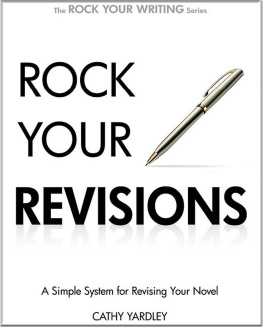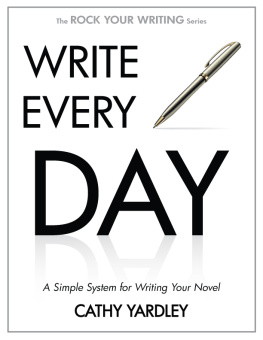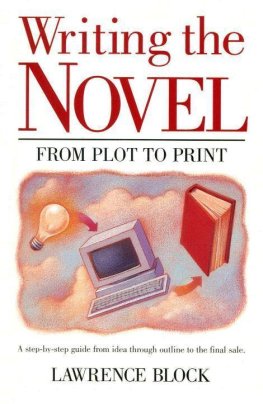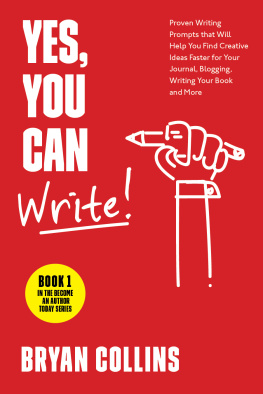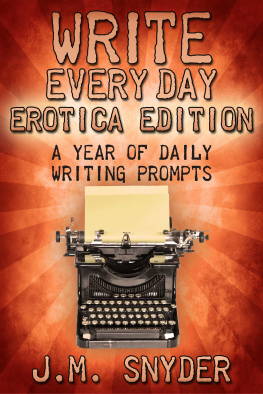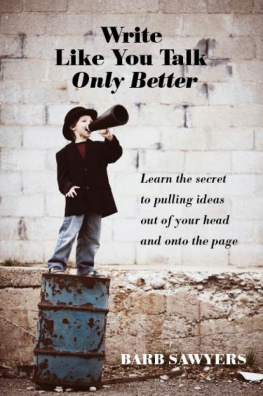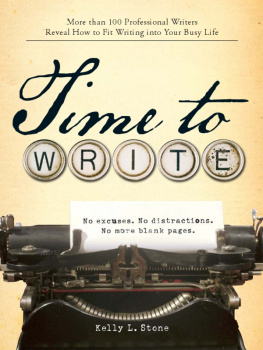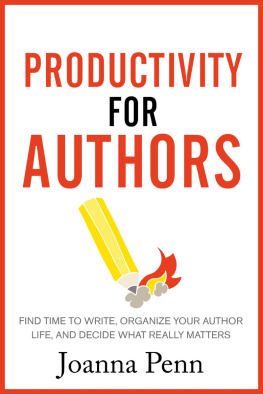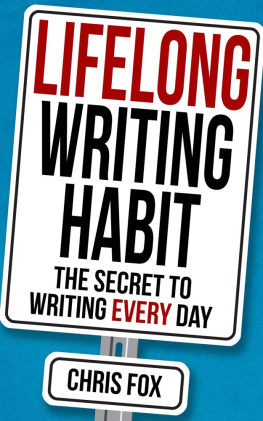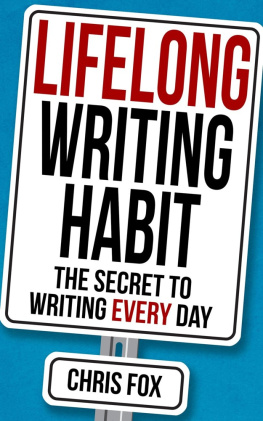Contents
Cover
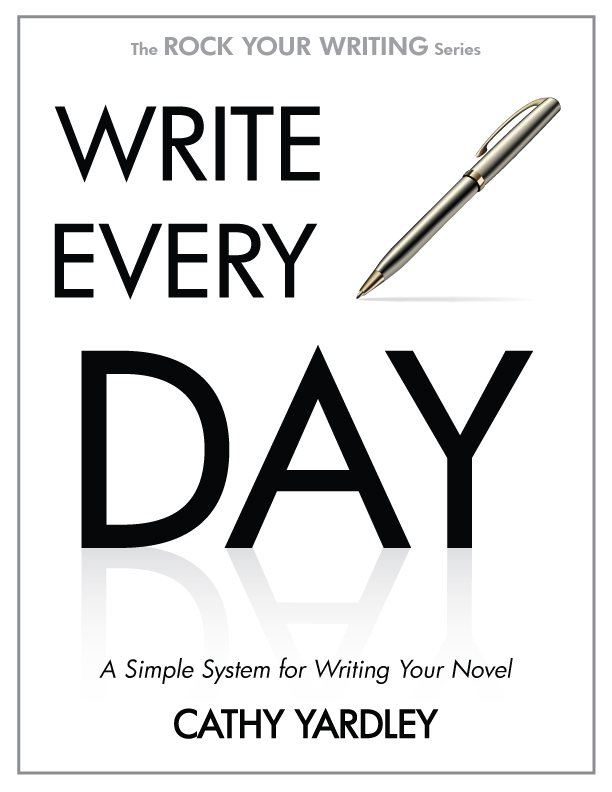
Write Every Day: How to Write Faster, and Write...
Write Every Day: How to Write Faster, and Write More
Content copyright Cathy Yardley Wilson 2013.
All rights reserved.
Published in the United States.
First Publishing Date July, 2013.
TABLE OF CONTENTS
Introduction
Chapter 1: Identifying Your Issues
Chapter 2: Time
Chapter 3: Energy
Chapter 4: Fear
Chapter 5: Process
Chapter 6: Support Network
Chapter 7: Action Plan
Conclusion
Further Resources
Free Download: Calendar pages and worksheets
Introduction
This is a book for people who want desperately to write novels.
You want to write them more easily.
You want to write them more quickly.
Most importantly, you just want to finish the book you've been working on, and then write a lot more of them.
Unfortunately, there's always something stopping you.
Maybe you don't have the time. Maybe you have the time, but you don't have the energy. Maybe you have the time, and the energy... but either you feel unfocused, or blocked.
You might blame yourself for being lazy or unorganized.
You might say to yourself:
"If only there was a boot-camp drill instructor kicking my butt, I'd get these books done!"
Or,
"If I could only find the perfect system, I'd finally be able to write those (however many) books a year!"
The pressure to write faster.
If you're a commercial genre fiction writer, there's a subtle (or not-so-subtle!) pressure to write more quickly. Generally speaking, publishing houses like to see a book out on the shelves every nine months. (That doesn't mean they'll guarantee you a publishing slot, but that's a different discussion.) If you have a book they like, and it does at all well, they're going to ask: "What else do you have?"
If you're planning on self-publishing, it seems like the most successful authors are also the most prolific. Consequently, the pressure to produce is there as well.
Go to a writer's chapter meeting for any genre fiction organization, and you'll usually get the advice: You need to write more! You need more books out there! Why aren't you writing?
A quick story about blocks, stress, and time management.
I wrote the first seven novels of my career while holding down a forty-hour-a-week day job. That said, there was a two-year gap between my first novel and my second where I simply couldn't, or wouldn't, write.
Frankly, I got scared and froze up.
I did finally manage to get over it and write several more. It still lingered in the background, and I still had gaps in my publishing history, but at least I was writing.
Then, in 2006, I had my son.
Instead of just managing a day job and the writing, I was now a work-at-home Mom. Despite the fact that I thought I'd prepared myself, I'll be honest: I wasn't ready for the combination of necessary self-direction and unavoidable sleep deprivation.
My energy, and my ability to focus, went right through the floor.
I was under contract for a trilogy, and I was freaked out about juggling everything on my plate. Considering my income now depended on finishing novels instead of just showing up to my cubicle and plugging away... well, needless to say, I was very, very motivated.
Despite this huge and obvious incentive, I still wrestled with another "dark period" of writer's block, in addition to suddenly having difficulty managing the baby, the house, promotion and proposals.
I had trouble finishing my novels and getting more sold. I went from writing and selling three books a year to struggling to complete one book in two years as bills piled up.
Searching for answers.
In the course of five years, I studied everything I could about time management, energy management, and creative blocks. I worked with coaches. I took classes.
I tried everything from the prosaic ("just get it done, stupid!") to the metaphysical (chakras-n-wind chimes, people. I kid you not.). It wasn't until I started putting all the pieces together that I started getting traction.
Finally, after a lot of experimentation and even more "failures," I was able to synthesize a process that helped me get my productivity back up, while keeping my writing quality high, and reaching some semblance of balance with my family, my creativity, and my business.
The result is this book. It won't necessarily work for everyone, and not everyone needs every element I cover here. But for some people, the approaches and solutions will provide a game-changer that will ultimately help you finish your novel and write more of them, in less time, with less stress.
What you will get out of this book.
This book is designed to do three things:
- It will help you identify what, exactly, is in the way of you completing your current book and/or writing more books that you love, more quickly and easily.
- It will help you pin down some solutions to those obstacles.
- It will give you an action plan to actually get the writing done, as well as a suggested template to prevent future roadblocks.
That sounds suspiciously easy.
If you feel like you've been spinning your wheels, and you're simply not getting the books written, there are usually a lot of interlocking factors at work. It seems impossible to pin down what's stopping you because it's as if everything is stopping you.
Let's say you've got a day job, and a family. You're serious about your writing: you want to complete at least one book this year.
But you've got an early meeting, and you've got a new assignment that's causing a lot of overtime. That's problem enough except when you do get out of work, surprise! Your son has his karate belt test, and he's not old enough to drive. Your twin daughters need your help with homework. You're then scrambling to figure out something to cook for dinner, and realize that you've got nothing clean to wear tomorrow. And what, exactly, did the dog drag on the living room floor?
By the time the kids are asleep, and you've got some clean laundry and you're purposefully (if somewhat guiltily) ignoring the dinner dishes, your spouse is perhaps asking you to watch some TV with him and complaining that he never sees you.
By the time you've watched an episode of The Walking Dead on demand with him, it's ten or eleven, and frankly, your brain is tapioca. You've got a better chance of spontaneously flying than you do of getting a scene written. After a few half-hearted attempts at sentences, you crawl to bed, ready to do it all again tomorrow.
On the off-chance you get a free hour on a weekend, you feel the pressure of getting something, anything written... but you pull together a hash of notes, and realize it's been so long since you've written, you're not quite sure where to start. Besides, you're still exhausted, which makes everything that much slower.
It takes you an hour to get your bearings and feel ready to write.
At which point, you stare at the blank page, with a rising sense of anxiety. You know you need to write... but where the hell are the words?
There are four main culprits at work here.
While the above seems like a big, hot mess of issues, the obstacles to writing basically fall into the four following camps:
- Time: not having enough of it, or not managing it well
- Energy: again, not having enough or not managing it
- Fear: blocks, "stucks," and avoidance
- Process: not being aware of what works for you, and not leveraging your systems and routines
You might have elements of all these obstacles. And yes, that's going to feel like one big, hairy, chaotic mess.




